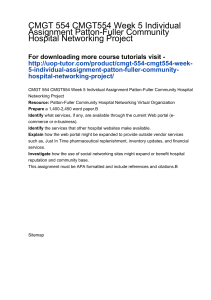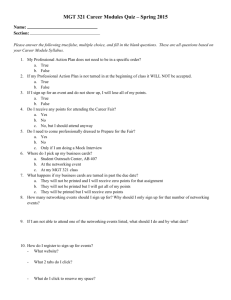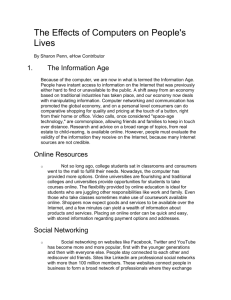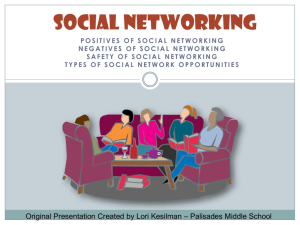Create a success criteria
advertisement
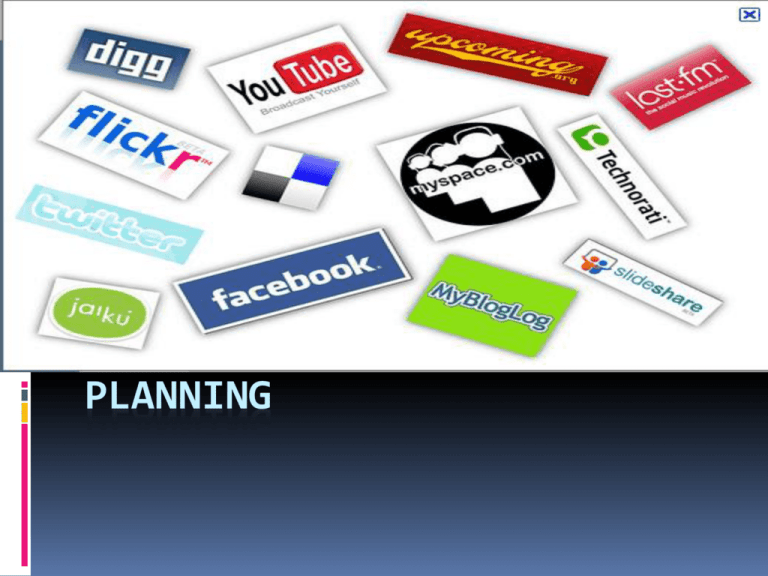
PLANNING Where will I collect this information from? Is Social Networking Safe? Do you use a social networking site like Facebook or MySpace? Have you ever considered that danger that site could represent to your identity? Most people don’t. But social networking Websites do present a problem. This article explains how the danger could be in the gadgets that you place on your site. Gadgets are little mini-applications that give you additional functionality. But if a gadget it created by someone trying to steal identities, it could give them access to your personal information. Social networking sites aren’t the only ones that use gadgets to add functionality, either. Google’s personalized home page and now even Windows Vista uses gadgets. Use caution when downloading or enabling them, though, because you never know when you might be opening your personal information up for collection. Examples of Success Criteria · The argument must be persuasive · The presentation must be interesting, attractive and understandable · Your information must be relevant · The sources of your information must be recorded. (i.e. say which web sites you got your info from) · Must be well presented (i.e. have good pictures, colours etc) · Good content in understandable words What information will I need? Is Social Networking Good or Bad Is social networking good or bad? It depends on who you ask. Social scientists and social psychologists enjoy the wealth of opportunities that social networks provide for studying social building and situations on a grand scale. Social networks are comprised of people, and they provide people with a way to connect with other people. Social networks are neither good nor bad. Researching Is Social Networking Good or Bad In business, social networking is a good thing. According to Catherine Brown, director of Enterprise Social Networking for Dotster, Inc., "A business social network is not like Facebook. It is the company's own community Web site (or a new tab on their current Web site) branded with their logo and material and devoted to their customers' needs and interests." Social networks on the web are community based and comprised of people. They are organized around users that log in and create accounts. Facebook, MySpace, LinkedIn and other networks encourage users to make friends, find old friends and add current friends. Groups also form on these sites that allow like-minded people to connect and become friends. Friends of friends link together and serve as effective outlets for distributing content that individual users enjoy, from YouTube videos to news stories to reviews and more. According to a 2007 research study social networks are the heart of popular sites on the Internet. The technology continues to mature, and will continue to influence personal and commercial online interactions. Social networking is used by college students, homemakers, business managers, actors, writers, researchers, teachers, directors, engineers, politicians and more. Political Machine During the 2008 Presidential election, social networks played a significant role for voters aged 18 to 29. A research study from the Pew Research Center found that 42% of voters in that key demographic obtained their campaign news and updates from the Internet, and more specifically social network sites. Supporters for President Barack Obama number over five and a half million on Facebook alone. To get out the message, social networks are better than community centers, town halls and phone banks. Politicians who grasp the power of the Internet can harness it to reach a demographic of voters who are less likely to watch television advertisements and debates, but are more willing to read position papers, post its and profiles. Social in Social Networks Trying to understand is social networking good or bad requires understanding that people are at the center of social networks. People can be good or bad and social networks have the same capability for abuse. The ability for friends, business associates and families to connect across the miles brings the world closer together. The same closeness allows for abuse, transmission of false ideas, frauds and scams. Recognizing the benefits of a social network is as important as exercising caution. A person wouldn't walk into the middle of a mall and believe everything that sales person at a kiosk tells them, or take financial advice from a stranger in the coffee shop. This is the same natural caution that must be exercised in all social networking interactions How will I keep records of all the sources I collect information from? Save it in our documents. My main argument will be: My audience will be: Year 6 Students. How will I make sure that my research isn’t biased? How will I check that my research is valid? Ill text it http://en.wikipedia.org/wiki/Social_network. I will use the following criteria to judge whether my presentation was successful: 1 I had to do research from sites. 2 Social networking is Good and Bad for people. 3 Alot of people judge Social Sites of Bullying. 4 5
